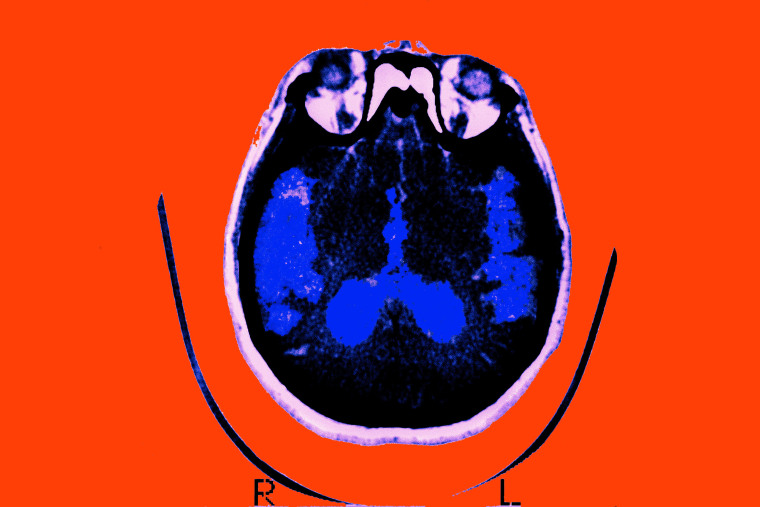By Aria Bendix and Denise Chow -
NBC News
Accusations that part of a key 2006 study into Alzheimer's disease may have been doctored have rattled the scientific community, casting doubt on the validity of the study's influential results.
The journal Science has announced this Thursday that it has discovered indications that the images of the famous study, published 16 years ago in the journal Nature, could have been manipulated.
The findings have cast skepticism on the work of Sylvain Lesné, a neuroscientist and associate professor at the University of Minnesota, and his research, which fueled interest in a specific set of proteins as a promising target for treating Alzheimer's disease.
Lesné has not responded to requests for comment from our sister network, NBC News, nor from Science magazine.
[A man with Alzheimer's falls in love with his wife for the second time and proposes to her]
Science announced that it found more than 20 "suspicious" articles by Lesné and identified more than 70 cases of possible image manipulation in its studies.
One whistleblower, Dr. Matthew Schrag, a neuroscientist at Vanderbilt University, raised concerns about possible image manipulation across multiple jobs last year.
Alzheimer's made him forget he's married.
So he proposed to his wife for the second time
July 7, 202102:03
Karl Herrup, a professor of neurobiology at the University of Pittsburgh Brain Institute who was not involved in the research, said the findings are "really bad for science."
"It's never embarrassing to be wrong in science," said Herrup, who also works at the school's Alzheimer's Disease Research Center.
“Much of the best science was done because people got it wrong and proved first if they were wrong and then why they were wrong.
What is completely toxic to science is being fraudulent,” she added.
For decades, one leading theory was that amyloid beta protein formed sticky plaques in the brain that were the main cause of Alzheimer's.
[FDA Approves First Alzheimer's Drug Amid Questions About Its Efficacy In Slowing Mental Decline]
The 2006 study in Nature identified a subtype of the protein - Aβ*56, or "amyloid beta star 56" - as the cause of memory loss in rats.
The paper caused "a huge stir at the time," said Donna Wilcock, associate dean of biomedicine at the University of Kentucky.
However, the journal Science said it had found evidence that the images in the paper - and those from other studies on Aβ*56 by Lesné - had been manipulated to inflate the protein's role in Alzheimer's progression, according to experts. who, like Wilcock, reviewed the images for Science.
Other researchers expressed concern that Lesné's results could not be replicated, a key part of the scientific process to confirm the validity of certain findings.
"In my own work, [Aβ*56] was not a species ... that we had ever observed," said Dr. Thomas Wisniewski, a professor of neurology at the New York University Alzheimer's Disease Center.
[FDA Limits Use of First Alzheimer's Drug After Criticism for Approval Without Strong Evidence]
Wisniewski, who was not involved in the investigation, said he looked at the footage on Monday and saw "evidence of what appears to be copying and pasting" to make a composite image.
Wilcock said he also noticed small areas of the images that appeared to have been "selectively enhanced."
Dr. Karen Ashe, a neuroscientist and professor at the University of Minnesota who co-authored the 2006 paper, said she wants to retract the study in its entirety, saying confidence in it has been undermined, but also argued that a retraction "does not call into question the beta amyloid hypothesis."
Brain scan of a patient with Alzheimer's disease. Axial section. BSIP/UIG / Universal Images Group via Getty Images
“Having worked for decades to understand the cause of Alzheimer's disease so that better treatments can be found for patients, it is devastating to discover that a co-worker may have misled me and the scientific community by manipulating data. images,” he said in an emailed statement.
Kat Dodge, a spokeswoman for the University of Minnesota School of Medicine, said the school is aware of issues surrounding the studies published by Lesné and Ashe.
[A woman convinces her husband that she has Alzheimer's in order to steal his money]
"The University will follow its processes to review the issues that have given rise to the complaints," he said Monday in a statement provided to NBC News.
Nature issued an editor's note on July 14 saying that it was investigating concerns about the 2006 article and that "further editorial response will follow as soon as possible."
More than $1 billion in government funding, through the National Institutes of Health, has been dedicated to amyloid-related Alzheimer's research.
Although the research suggests that Aβ*56 studies should be opened up to new scrutiny, experts said the entire theory should not be debunked.
“More work needs to be done by other groups to try to specifically replicate this work in other experimental models,” Wisniewski said.
Herrup said it wasn't just Lesné's work that influenced the direction of Alzheimer's research over the past two decades.
"There were a lot of other forces that drove that conceptualization of the disease," he said.
But these types of incidents can be hugely damaging to scientists and the research community in general, according to experts.
"It really hurts and erodes public trust in the scientific process," Wilcock said.
“That is the most disturbing thing and the thing that bothers me the most as a scientist.”

